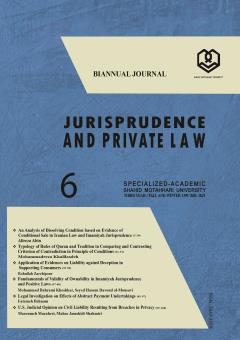-
-
-
Open Access Article
1 - Jurisprudential and Legal Study of the Concepts of Right and Decree
Seyed Alireza ForoughiRight in Islamic jurisprudence entails two meanings: First, right in its general sense, means property and decree and in its specific sense it means right. The examples for this denotation of right are the right of fatherhood, right of guardianship for the ruler, right MoreRight in Islamic jurisprudence entails two meanings: First, right in its general sense, means property and decree and in its specific sense it means right. The examples for this denotation of right are the right of fatherhood, right of guardianship for the ruler, right of administratorship, right of custody and the like. Although these are interpreted as right in the literature of the jurisprudents, they are all examples of decree. Second, right in its particular sense is vis-à-vis property and decree. Therefore, it has been said that the jurisprudents who put right in front of property and decree, they mean a type of religiously obligatory decree, which is also called religious decree or the decree of the Legislator. However, in cases we consider decree in its general sense, either obligatory or enacted, it is clear that right (like property) is a type of enacted decree. Therefore, decree in its general sense is attributable to its particular meaning (second meaning). On this basis, when right is compared and contrasted with decree, the denotative meaning of the two is involved and when in jurisprudence, jurists talk about the effects and consequences of right, like the capacity to waiver, and transfer, they mean that right possesses these effects as an enacted decree and its independent rational validity. On the contrary, the obligatory decree lacks such characteristics. This paper is an attempt to study the relationship between obligatory decree and enacted decree, and as well as the viewpoints of theoreticians at law and the independent viewpoints. Attempts also have been made to discuss the criteria for distinguishing right from decree and the procedure and criteria for judgment when doubt is raised about right and decree. In case of the absence of criteria, what shall be the basis for performance? Manuscript profile -
Open Access Article
2 - Jurisprudential and Legal Investigation of Digital Data Value and Ownership in Cyberspace
Seyed Alireza Foroughi Asma Hosseinzadeh SereshkiAbstract: In this study, we have classified digital data into three groups to precisely investigate digital data value and ownership: (1) Digital data with foreign likeness. Cyberspace is an environment for intellectual property such as computer software that are availa MoreAbstract: In this study, we have classified digital data into three groups to precisely investigate digital data value and ownership: (1) Digital data with foreign likeness. Cyberspace is an environment for intellectual property such as computer software that are available as digital data. (2) Big data that is naturally realizable outside the network but is available in cyberspace since it is large in volume and time-consuming for external handling. (3) Data such as domain and web hosting that are instruments for cyberspace and there is no foreign likeness for them and they have been created according to the requirements of the cyberspace. The value of the digital data is determined by the data’s economic value on one hand, and on the other hand, by inference to the types of properties in Fiqh and Islamic law. Ownership, too, in the context of full claim on digital data is acceptable due to the advantage of possessing it. In this study, we have studied each category under a certain legal system with respect to the characteristics of each category and qualities of properties according to Fiqh and Islamic law: The first and second groups – as intellectual rights – are placed under the principle of intellectual property and its rules of ownership. Cyberspace instruments shall be considered as the infrastructures such as hardware and the resulting benefits as well as ownership of such data will be investigated under civil property system. Manuscript profile -
Open Access Article
3 - Role of Injustice in Jurisprudential Inference
Seyed Alireza Foroughi Mahdi MohammadiJustice and injustice are two influential and highly debated issues in human schools of thought. One key discussion in this regard, is the role the concept of injustice can play in the procedures related to inference of the religious rules. This paper intends to clarify MoreJustice and injustice are two influential and highly debated issues in human schools of thought. One key discussion in this regard, is the role the concept of injustice can play in the procedures related to inference of the religious rules. This paper intends to clarify the role of injustice in this procedure. Based on the dictionaries, especially those belonging to the immediate post-Revelation period, injustice means “trespassing limits”. It also means the same in religious texts, the Holy Quran in particular. On this basis, in jurisprudential inference, injustice takes place whenever one trespasses the limits specified by the legislator. The valid limits in jurisprudence are the same specified by the legislator as well as the rational and common limits based on which the legislator has set the limits or avoided prohibition. Consequently, injustice is a criterion at work throughout the totality of jurisprudence and legal inference. Two major roles have been considered for injustice: First, in cases where attribution of something or reasoning is in incompatibility with general guidelines of Sharia law, it can restrict reason or dissuade the case. Second, it can serve as a proof of judgment in jurisprudential ramifications and newly raised issues. Manuscript profile
List of Articles Seyed Alireza Foroughi
-
The rights to this website are owned by the Raimag Press Management System.
Copyright © 2017-2024


